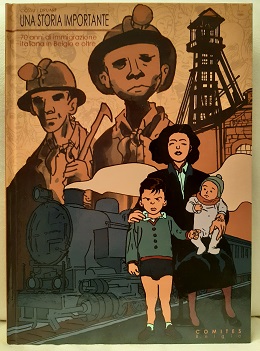- Daily & Weekly newsletters
- Buy & download The Bulletin
- Comment on our articles
Community life in Belgium: The Committee of Italians Abroad protects citizens rights and promotes its culture
Describe your role in the Committee of Italians Abroad and how you became involved?
I’m the secretary general and a member of the board of the Brussels, Brabant and Flanders committee of Italians Abroad. I’m Involved in all initiatives that relate to rights and citizenship (I’m a lawyer by profession), as well as being involved in cultural events.

After living in Brussels for a while, I realised I wanted to do something useful for my compatriots. While searching on the internet I found out about the law establishing the committees of Italians abroad. I got in touch with someone setting up a list of candidates and I ran for the election… et voila!
What are the aims of this international organisation?
It’s an official representative body established by the Italian national act of 1985. Such bodies exist in each city of the world where at least 3,000 Italians reside permanently. In Belgium, where the Italian community is huge, there are five: Brussels, Mons, Liège, Charleroi and Genk. Committees can do a lot of things; promote the Italian community in the host country with social and cultural activities in collaboration with Italian associations and institutions. It’s also very important that we cooperate with all the Italian consulates in Belgium, protecting the rights of Italian citizens in their respective districts.
Can you give some examples of your consular work?
As it’s easier for us to reach out to the diplomatic networks, during the first Covid-19 lockdown, we received many requests for assistance and help by Italians who wished to repatriate back to Italy. So we provided some support to the embassy and the consulate services to organise such repatriations.

How has the Italian community integrated in Belgium?
The Italian community has many layers; our migration history dates back 70 years. The Brussels committee told the story of Italian migration to Belgium in a cartoon that we produced last year with the Italian ministry for Foreign affairs and the province of Wallonia (pictured, above). In the beginning, it was not easy for migrants. The Italians who came to work in coal mines suffered discrimination, so their integration was limited and they lived in terrible conditions. It was not easy for them to regain their dignity. The former prime minister [Elio Di Rupo] belongs to that wave of Italian migrants who managed to integrate themselves into Belgian society. Many of them gave up their Italian passport as the law at that time did not accept dual nationality.
Of course, Italian migration has changed a lot in recent decades, especially with many Italians coming to work for the EU institutions. Nowadays we see another wave of Italian migration, and not only a brain drain. All professions are coming to Belgium to study and to work, mainly due to the lack of opportunities in Italy.
What do Italians appreciate about life in Belgium?
It really depends on their place of origin. I’m from Bari in the Puglia region, and I appreciate very much the level of organisation here as well as the healthcare, the social security and the rich cultural life. I think this is a shared feeling by Italians. Everything is much easier compared to Italy and we appreciate the job opportunities as well as the cultural life.
How have you been providing practical advice and organising cultural events during the confinement?
Of course the pandemic has affected live events so our monthly meetings are now held online and are open to the public. We are organising a second webinar on fiscal issues for Italians resident in Belgium. And we support online cultural events while waiting for venues to open again. In November 2020, we organised the Italian Jazz Festival in collaboration with the Italian cultural institute in Brussels. We are also planning on celebrating the 700th anniversary of Dante Alighieri in cooperation with Italian and Belgian institutional partners.
Tell us about your annual charity ball?
I’m very proud of it. It’s called Grand bal d’italie (pictured, main image) and it’s a charity event that I started in 2016 with a couple of friends. It’s organised every year under the auspices of the Italian embassy in Belgium and is in cooperation with Italian cultural institute of Brussels. It has really become the place to be for the Italian and international community. We aim not only to have fun but to promote a different aspect of Italian culture each year: cinema, opera, fashion and design, folklore, music and gastronomy. in 2020 we couldn’t hold it for obvious reasons, but this year we will organise it around the 100th anniversary of film director Federico Fellini. The event was included in the 2018 European year of cultural heritage and has received patronage from many Italian institutions.
Is the event open to other nationalities?
Indeed, the charity ball is open to anyone who wants to take part. We have around 400 guests on the night and only one third of them are Italian. Thanks to the proceeds of the charity gala we have been able to support social assistance projects in Belgium.
If you would like to talk to the Bulletin about your community group, contact editorial@thebulletin.be



















